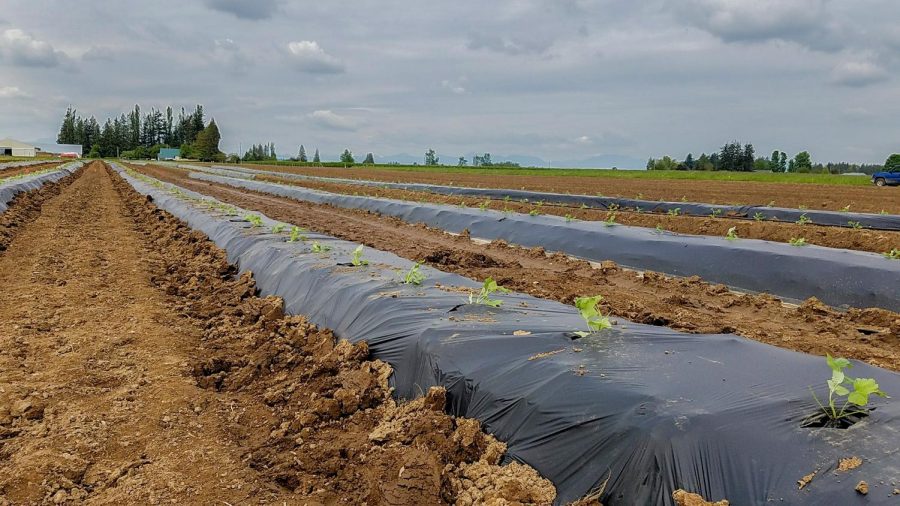Researchers examine eco-friendly mulch
Nonbiodegradable mulch is not properly disposed of; burning plastic releases toxins
COURTESY OF LISA WASKO DEVETTER
A raspberry field is mulched with biodegradable plastics. Growers do not tend to put mulch in raspberry fields. Instead, they use herbicide and weed by hand, says Lisa Wasko DeVetter, WSU horticulture assistant professor.
October 25, 2019
WSU horticulture researchers compared soil-biodegradable plastic mulch with nonbiodegradable plastic mulch and found comparable yields for both mulches.
This means farmers who presently use nonbiodegradable plastic mulch may one day have an affordable alternative to fighting weeds in their field.
Mulching hinders weed growth, conserves moisture and warms the soil, said Carol Miles, WSU professor in the department of horticulture.
Farmers incur costs with the removal and disposal of the nonbiodegradable plastic mulch. They must pick up the mulch at the end of the season, which involves labor costs, and they must pay the landfill to dispose of the mulch, Miles said.
Regular plastic mulch left in the field is detrimental to soil quality, said Lisa Wasko DeVetter, assistant professor of horticulture. If plastics in soil make it to in waterways, they can end up in the ocean.
“There’s not a lot of sustainable disposable solutions for nondegradable plastic,” DeVetter said.
DeVetter leads the small fruit horticulture program. She works with raspberries, blueberries and strawberries. Traditionally, raspberry growers have not used mulch, instead using herbicides and weeding by hand, she said.
“We found plastic mulches are a really promising tool for growers in a system that has never used plastic mulches,” she said.
Researchers have found that soil-biodegradable and nonbiodegradable mulches lead to the same yield for strawberries, she said.
Miles tests biodegradable mulches in vegetable systems, such as pumpkins, tomatoes, lettuce and watermelon. She said she has found that soil-biodegradable mulch has given similar yields for crops as nonbiodegradable mulch.
There is no added cost for the removal and disposal of soil-biodegradable mulch. Farmers can till in the soil-biodegradable plastic mulch when they till their fields, Miles said.
Farmers till the soil to remove weeds and refresh the soil or to prepare it for the next planting, DeVetter said.
Many farmers in the U.S. do not dispose of nonbiodegradable mulch properly, instead burning the plastic in fields, which releases toxins. However, many Washington farmers are more sustainably minded and take mulch to the landfill, Miles said.
Researchers tested various thicknesses of mulch because they wanted to use a thinner biodegradable mulch because it is cheaper, DeVetter said.
She said researchers are looking at why the soil-biodegradable mulch is not biodegrading completely, so they are looking at other organic materials that can help.
“Agriculture is providing us a leading role in investigating soil-biodegradable plastics,” Miles said.










